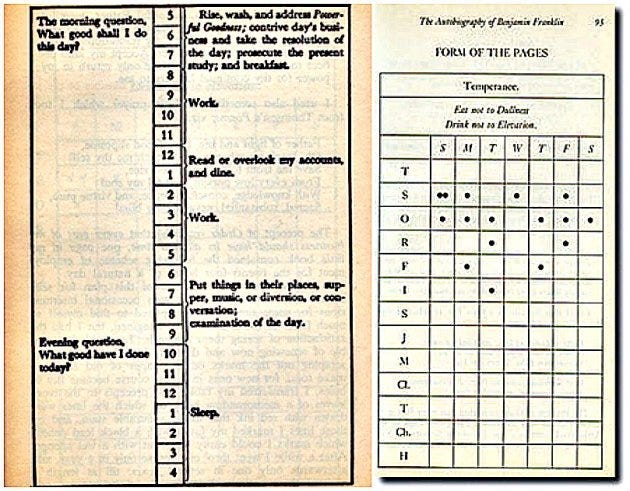Why Constant Learners All Embrace The 5-Hour Rule
Benjamin Franklin did this 1 hour a day, 5 hours a week. Why you should do it too.
Author’s Note: This article was written over 60 hours with love and care using the blockbuster mental model.
At the age of 10, Benjamin Franklin left formal schooling to become an apprentice to his father. As a teenager, he showed no particular talent or aptitude aside from his love of books.
When he died a little over half a century later, he was America’s most respected statesman, its most famous inventor, a prolific author, and a successful entrepreneur.
What happened between these two points to cause such a meteoric rise?
Underlying the answer to this question is a success strategy for life that we can all use, and increasingly must use.
The 5-Hour Rule
Throughout Ben Franklin’s adult life, he consistently invested roughly an hour a day in deliberate learning. I call this Franklin’s five-hour rule: one hour a day on every weekday.
Franklin’s learning time consisted of:
Waking up early to read and write
Setting personal growth goals (i.e., virtues list) and tracking the results
Creating a club for “like-minded aspiring artisans and tradesmen who hoped to improve themselves while they improved their community”
Turning his ideas into experiments
Having morning and evening reflection questions
Every time that Franklin took time out of his busy day to follow his five-hour rule and spend at least an hour learning, he accomplished less on that day. However, in the long run, it was arguably the best investment of his time he could have made.
Franklin’s five-hour rule reflects the very simple idea that, over time, the smartest and most successful people are the ones who are constant and deliberate learners.
Warren Buffett spends five to six hours per day reading five newspapers and 500 pages of corporate reports. Bill Gates reads 50 books per year. Mark Zuckerberg reads at least one book every two weeks. Elon Musk grew up reading two books a day, according to his brother. Oprah Winfrey credits books with much of her success: “Books were my pass to personal freedom.” Arthur Blank, co-founder of Home Depot, reads two hours a day. Dan Gilbert, self-made billionaire and owner of the Cleveland Cavaliers, reads one to two hours a day.
So what would it look like to make the five-hour rule part of our lifestyle?
Empty Space Is Central To The 5-Hour Rule
To find out, we need to look no further than chess grandmaster and world-champion martial artist Josh Waitzkin. Instead of squeezing his days for maximum productivity, he’s actually done the opposite. Waitzkin, who also authored The Art of Learning, purposely creates slack in his day so he has “empty space” for learning, creativity, and doing things at a higher quality. Here’s his explanation of this approach from a recent Tim Ferriss podcast episode:
I have built a life around having empty space for the development of my ideas for the creative process. And for the cultivation of a physiological state which is receptive enough to tune in very, very deeply to people I work with … In the creative process, it’s so easy to drive for efficiency and take for granted the really subtle internal work that it takes to play on that razor’s edge.




